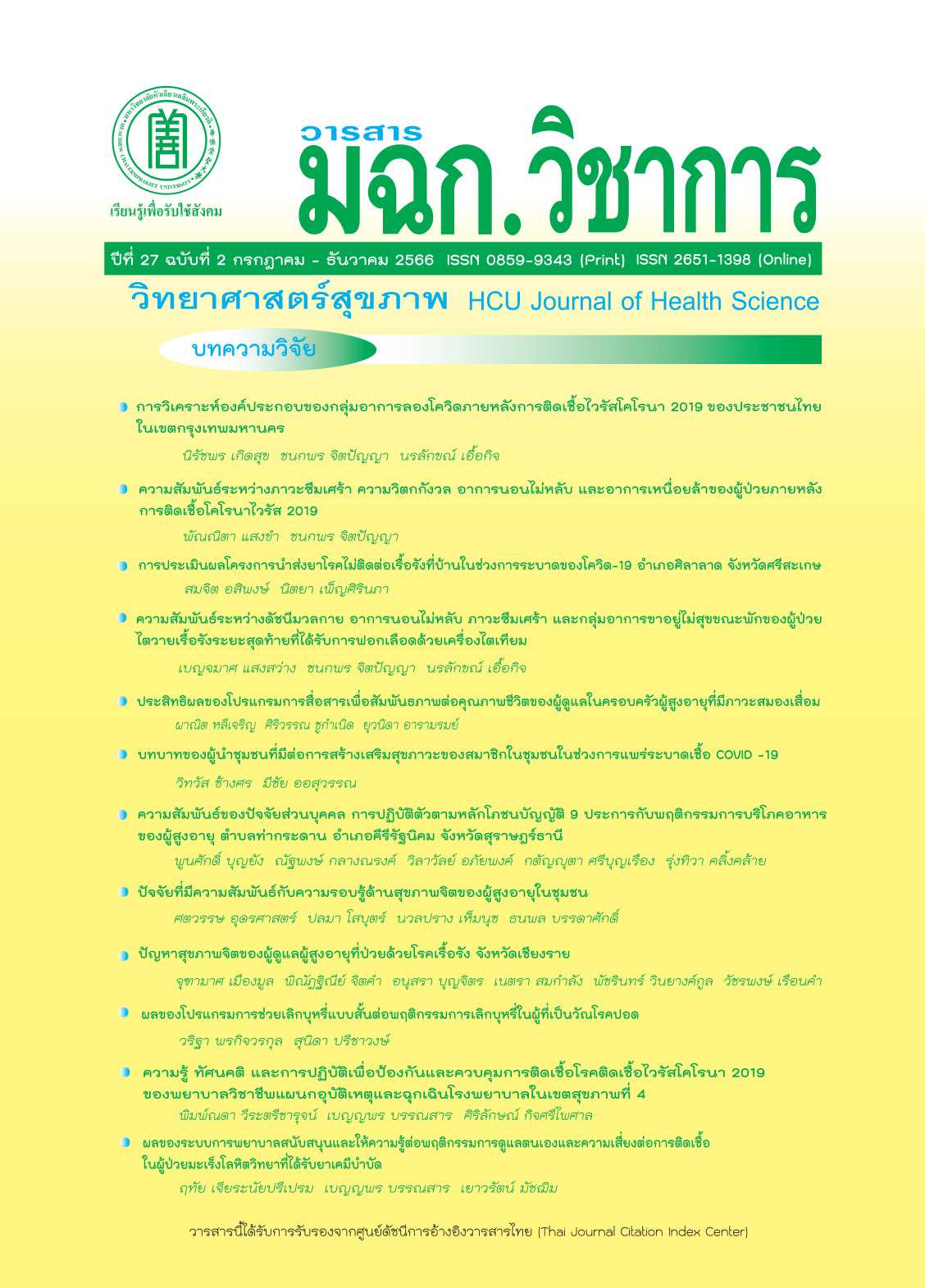The Role of Community Leaders in Enhancing the Well-Being of Community Members during the Spread of COVID-19
Keywords:
leadership, community well-being, participatory communicationAbstract
The purpose of this qualitative research was to examine the community leaders’ roles in enhancing the well-being of community members who resided in Bangkok, Samutprakarn, Nonthaburi, Khonkaen, Krabi, Kanchanaburi and Suphanburi during the COVID-19 pandemic. Using case studies as a research design, the researchers collected data through In-depth Interviews with 20 Key Informants (7 community leaders and 13 community members) to interpret the roles of the community leaders in enhancing the well-being of community members during the spread of COVID-19. The data were collected during October 2021 and October 2022. The research found that their community leaders took on eight (8) vital roles: motivator, learning space creator, leader maker, facilitator, fundraiser, peacemaker, human resource creator, and public relation and communicator.
Downloads
References
Ortega FB, Ruiz JR, Castillo MJ, Sjöström M. Physical fitness in childhood and adolescence: a powerful marker of health. International Journal of Obesity. 2008;32:1-11.
Ghaljahi M, Rahdar S, Almasi SZ, Ahmadi S, Igwegbe CA. Survey dataset on the externalizing self-esteem and gender effects on self-esteem subscales of students in Zabol University of Medical Sciences, Iran. Data in Brief. 2018;21:40–413.
Teungfung R, Choiejit R. Socio-economic Security and Happiness of Bangkok Residents. Journal of Social Development (JSD). 2015;17(1):111-33.
Larson JS. The measurement of social well-being. Social Indicators Research. 1993;28:285–96.
Maa J, Dongb G, Chenc Y, Zhang W. Does satisfactory neighbourhood environment lead to a satisfying life? An investigation of the association between neighbourhood environment and life satisfaction in Beijing. Cities. 2018;74:229-39.
Defining Learning Communities [Internet]. Centre for Research & Learning. 2003 [cited 2019 November 6 ]. Available from: https://www.researchgate.net/publication/43527785_Defining_Learning_Communities.
Wisetpatsa P. Effects of Research-Based Community Learning on Concepts of Social and Culture Change and Attitudes Towards Thai Culture Conservation of Tenth Grade Students. Bangkok: Chulalongkorn University; 2013.
Tufte T, Mefalopulos P. Participatory Communication A Practical Guide. Washington, D.C.: The International Bank for Reconstruction and Development / The World Bank; 2009.
Holden M. Correction to: Community Well-Being in Neighbourhoods: Achieving Community and Open-Minded Space through Engagement in Neighbourhoods. International Journal of Community Well-Being. 2018;1:45-61.
Public Space, The Public Sphere, And The Urban As Public Realm [Internet]. 2017 [cited 2019 Demcember 29]. Available from: http://currychandler.com/cool-medium/2017/2/6/public-space-the-public-sphere-and-the-urban-as-public-realm.
Setkij W. Sustainable Development in the context of National Development. Burapha Journal of Political Economy (JPE). 2020;8(1):81-106.
Srisun S. Self-reliance Concept of Country People: Demeaning the Rural to a Dichotomous of Urban. Humanities and Social Sciences (HUSO). 2015;32(2):183-208.
Chaisuktaksin N, Putsukee T, Dhammasaccakarn W. Leadership Prototypes for Community Well-being Behaviral Change. Journal of Education Taksin University. 2019;19:1.
Klingborg DJ, Moore DA, Varea-Hammond S. What Is Leadership? Journal of Veterinary Medical Education (JVME). 2006;33(2):280-3.
Abbas W, Asghar I. The Role of Leadership in Organizational Change: Relating the Successful Organizational Change with Visionary and Innovative Leadership. Kungsbäcksvägen: University of Gavle; 2010.
Thawinkarn D. “Super Leadership” in the 21stCentury. Journal of Educational Administration, Khon Kaen University (J Ed Admin KKU). 2015;11(2):23-35.
Nujoi A, Disathapon C, Lohidwisard S. Learning Community Learder. Journal of Research and Curriculum Development (JRCD). 2016;6(2):49-64.
Chaisuktaksin N, Putsukee T, Dhammasaccakarn W. Leadership Prototypes for Community Well-being Behaviral Change. Journal of Education Thaksin University. 2019;19(1):99-114.
Techaatik S, Wongarsa W. Community Well-Being Development for Healthy Life. Humanities & Social Sciences (HUSO). 2012;29(2):1-22.
Thaunbula C, Malaheng M. The participation of Thai political reform in the community dimension through coffee meeting; the case study: Mueang District of Narathiwat. Bangkok: King Prajadhipok's Institute; 2018.
McCreaa R, Waltona A, Leonard R. A conceptual framework for investigating community wellbeing and resilience. Rural Society. 2015;23(3):270–82.
Roongkan Musakophas, Weerapong Polnigongit. Current and future studies on participatory communication in Thailand. Kasetsart Journal of Social Sciences (Kasetsart J Soc Sci). 2017;38:68-73.
Keating C. Evaluating Community Arts and Community Well-Being. Victoria: Effective Change; 2002.
Nguyen QD, Fernandez N, Karsenti T, Charlin B. What is reflection? A conceptual analysis of major definitions and a proposal of a five-component mode. Medical Education. 2014;48(12):1176–89.
Ricketts A. Participation in place-making: Enhancing the wellbeing of marginalised communities in Aotearoa/New Zealand. Wellington: Victoria University of Wellington; 2008.
Kheawkham T, Saengpun J. Teachers’ classroom reflection in professional learning community using lesson study and open approach. Silpakorn University Journal (SUJ). 2019;39(6):187-98.
Padang PN, Inggris JB. Leader Vision for Effective Leadership. Journal Polingua. 2012;1(1).
Sricharumedhiyan C, Vaddhano PT. Leadership and Community Development. Journal of MCU Peace Studies Special Issue (JMPS). 2018;6(sp1):527-38.
Downloads
Published
How to Cite
Issue
Section
License
Copyright (c) 2023 HCU Journal

This work is licensed under a Creative Commons Attribution-NonCommercial-NoDerivatives 4.0 International License.
บทความที่ได้รับการตีพิมพ์เป็นลิขสิทธิ์ของวารสารวิทยาศาสตร์สุขภาพและสุขภาวะ
ข้อความที่ปรากฏในบทความแต่ละเรื่องในวารสารวิชาการเล่มนี้เป็นความคิดเห็นส่วนตัวของผู้เขียนแต่ละท่านไม่เกี่ยวข้องกับมหาวิทยาลัยหัวเฉียวเฉลิมพระเกียรติ และคณาจารย์ท่านอื่นๆในมหาวิทยาลัยฯ แต่อย่างใด ความรับผิดชอบองค์ประกอบทั้งหมดของบทความแต่ละเรื่องเป็นของผู้เขียนแต่ละท่าน หากมีความผิดพลาดใดๆ ผู้เขียนแต่ละท่านจะรับผิดชอบบทความของตนเองแต่ผู้เดียว




